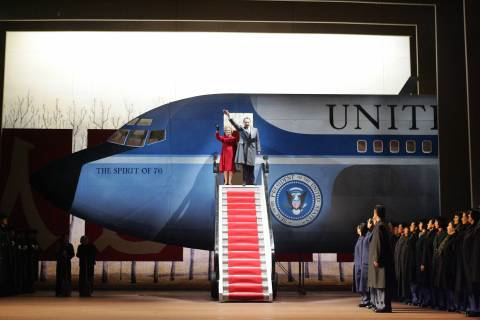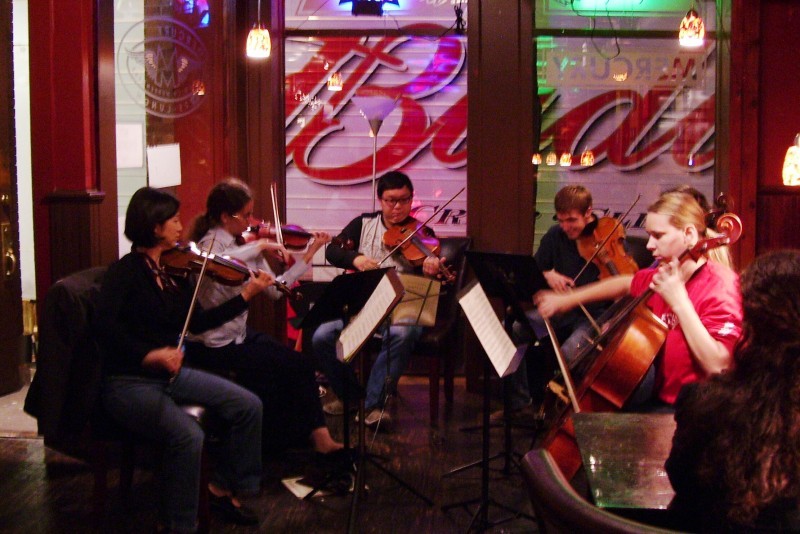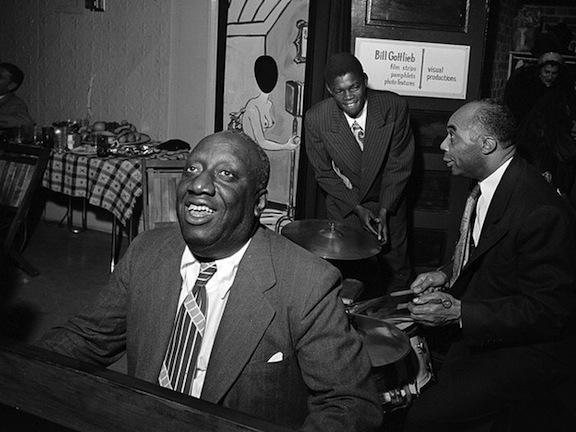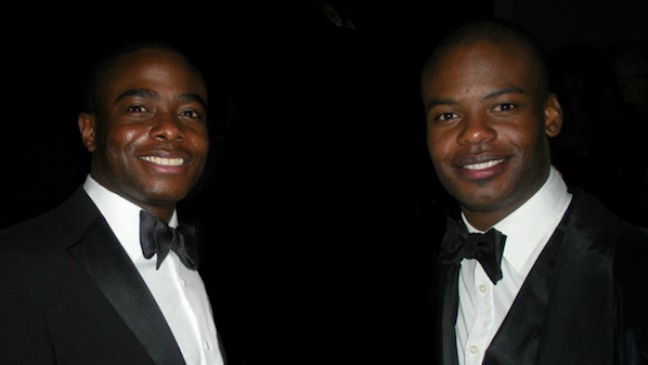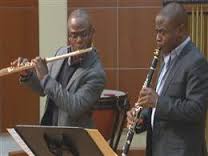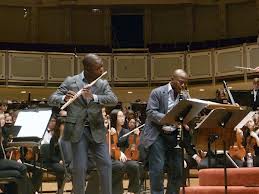The Well-Tempered Ear
Wisconsin Chamber Orchestra’s new CD and Friday night concert champion racial diversity
1 Comment
PLEASE HELP THE EAR. IF YOU LIKE A CERTAIN BLOG POST, SPREAD THE WORD. FORWARD A LINK TO IT OR, SHARE IT or TAG IT (not just “Like” it) ON FACEBOOK. Performers can use the extra exposure to draw potential audience members to an event. And you might even attract new readers and subscribers to the blog.
By Jacob Stockinger
“Musical Landscapes in Color” is a five-year initiative by the Wisconsin Chamber Orchestra with its award-winning, composer-in-residence Dr. William Banfield (below), who has produced a body of work in the past 25 years that includes music, books, teaching and creative work that contributes to contemporary arts leadership.
The cultural undertaking aims to elevate the voices of an array of living, diverse composers of color throughout the United States. The project represents a significant step towards diversifying the classical music landscape through compositions and audiences, according to the WCO.
The first of several installments (below) — “Harmony in Black” — has just been released by Albany Records.
The album is available in a physical format and for digital streaming on Spotify, Apple Music, Amazon Music and YouTube, where you can sample it at the bottom.
Performed and recorded live on Friday, Oct. 13, 2023, it features excerpts from three compositions: one by four-time Grammy nominee Patrice Rushen entitled “Mine Eyes Have Seen The Glory”; and two by renowned composer Banfield entitled “Testimony of Tone, Tune, and Time” and “Symphony No. 8: Here I Stand.”
Their three compositions do not quote spiritual melodies directly, but do embody the spirit of those songs by drawing either on direct quotations of speeches or writings.
Multi-Grammy-nominated artist Patrice Rushen (below) is admired by many for her groundbreaking achievements including serving as Musical Director for the 46th, 47th and 48th Annual Grammy Awards.
CONTENTS:
Patrice Rushen: Movement 1: ”Mine Eyes Have Seen the Glory”
Dr. William Banfield: (starting at 8:10): “Testimony of Tone, Tune and Time” — Symphony No. 8
Performers are: retired City of Madison, Dane County and State of Wisconsin Judge Paul Higginbotham (below) as the narrator; saxophonist Matthew Sintchak; and the Wisconsin Chamber Orchestra under conductor and music director Andrew Sewell.
For more background, including a release reception, go to a story in Madison 365:
A WORLD PREMIERE THIS FRIDAY NIGHT
The project continues with a concert that takes place this Friday night, March 22, at 7:30 p.m. in the Capitol Theater of the Overture Center features the WORLD PREMIERE of Banfield’s Symphony No. 14 “Revelation.”
Guest artists include the Madison Youth Choirs, the Festival Choir of Madison and the Edgewood College Chamber Singers. Soloists include soprano Angela Brown, tenor Ben Johnson and baritone William Volmar.
Opening the 90-minute concert is Symphony No. 1 in G major, Op. 4 (1901) by British composer Edwin York Bowen, whose music shows influences of Rachmaninov, Chopin and Tchaikovsky.
Tickets are still available and cost $34.50, $75 and $95. For more information and tickets, go to: https://wcoconcerts.org/
Have you heard Banfield’s music?
What do you think of it?
The Ear wants to hear.
Tags: #BlogPost, #BlogPosting, #Composer-in-Residence, #FacebookPost, #FacebookPosting, #YouTubevideo, Abraham Lincoln, achievement, African, African American, African-American music, Albany Records, Album, Amazon, Amazon Music, American, Andrew Sewell, Android, Angela Brown, appellate, Apple Music, Apple Music Classical, Arts, asian, audience, award, baritone, Ben Johnson, black, Black composers, black music, blog, books, box office, British, Capitol Theater, CD, Cello, Chamber music, champion, Chopin, choral music, circuit court, city of Madison, civil rights, Classical music, color, Compact Disc, composer, composers of color, Composition, Concert, contemporary, contemporary composers, contemporary music, cost, court, creative, Dane County, digital, diversity, doctor, Dr., Edgewood College, Edgewood College Chamber Singers, Edwin York Bowen, England, English, enslaved, enslaved people, entitled, Europe, excerpts, Facebook, Festival Choir, format, Friday, Friday night, Google, Google Alert, Google Search, Grammy, groundbreaking, harmony, Harmony in Black, influence, information, initiative, IOS, it, Jacob Stockinger, judge, landscape, Latino, leadership, Lincoln, link, live, live music, Live Recording, living composers, Madison, Madison 365, Madison Youth Choirs, Madison365, Madison365.com, Martin Luther King, Martin Luther King Jr, Matthew Sintchak, melodies, melody, Mine Eyes Have Seen The Glory, MLK, movement, Music, musical, narrator, nominee, online, opera, Orchestra, Overture Center, Patrice Rushen, Paul Higgenbotham, physical, Polish, Polish composer, post, posting, premiere, price, project, quotations, race, Rachmaninoff, Rachmaninov, racism, recording, retired, Revelation, Russia, Russian, sample, Saxophone, saxophonist, share, sing, singer, Singing, slave, slavery, soloist, song, soprano, speech, speeches, spirit, spiritual, Spotify, State of Wisconsin, streamed music, streaming, streaming service, symphony, tag, Tchaikovsky, Teacher, teaching, tenor, testimony, The Ear, think hear, tickets, time, title, tone, tune, Twitter, U.S., UK, United States, Viola, Violin, vocal music, vocalist, WCO, Website, William Banfield, William Volmar, Wisconsin, Wisconsin Chamber Orchestra, work, works, world, world premiere, writings, X, year, York Bowen, you, YouTube
Classical music: Here is music that asks for and then grants the peace we need now
2 Comments
PLEASE HELP THE EAR. IF YOU LIKE A CERTAIN BLOG POST, SPREAD THE WORD. FORWARD A LINK TO IT OR, SHARE IT or TAG IT (not just “Like” it) ON FACEBOOK. Performers can use the extra exposure to draw potential audience members to an event. And you might even attract new readers and subscribers to the blog.
By Jacob Stockinger
Is The Ear alone in being reminded of the year 1968 and its various social, political and personal upheavals?
What explains it?
What are the parallels, if any?
Is it the national and international protests against police injustice and racism (below, in a photo by Getty Images)?
Is it the violence and riots that followed the assassination of Martin Luther King Jr. and opposition to the Vietnam War?
Is it the isolation and deaths (below, in a photo by ABC News) brought about by the coronavirus pandemic and the more than 100,000 deaths in just the U.S. from COVID-19?
Whatever you think and whether you agree or not, we all can use some peace.
Here is some music that both asks for peace and grants it.
It is the “Dona Nobis Pacem” (Grant Us Peace) from the “Mass in B Minor” by Johann Sebastian Bach, performed in the YouTube video below by Robert Shaw conducting the Atlanta Symphony Orchestra and Chamber Chorus with soloists.
If there are other pieces of classical music that serve that same purpose and you would like to hear, leave your suggestion in the comment section.
Tags: #ABCNews, #BaroqueMusic, #BlackLivesMatter, #BlogPost, #BlogPosting, #BMinorMass, #ChoralMusic, #COVID-19, #FacebookPost, #FacebookPosting, #GeorgeFloyd, #GettyImages, #GrantUsPeace, #JacobStockinger, #JohannSebastianBach, #MartinLutherKing, #RobertShaw, #SocialDistance, #SocialDistancing, #TheEar, #VietnamWar, #VocalMusic, #YouTubevideo, 1968, ABC News, agree, Arts, assassination, Atlanta Symphony, Bach, Baroque music, big, black, Black Lives Matter, blog, choral music, chorus, Classical music, composer, conduct, conductor, coronavirus, death, destructive, Early music, Facebook, forward, George Floyd, Getty Images, Grant Us Peace, injustice, international, isolation, Jacob Stockinger, Johann Sebastian Bach, justice, like, link, Martin Luther King, mass, Mass in B Minor, MLK, Music, national, news, Orchestra, pandemic, parallels, peace, personal, photo, police, political, post, posting, protest, remind, riot, Robert Shaw, share, social, tag, Television, The Ear, think, TV, United States, upheaval, Vietnam War, violent, vocal music, war, YouTube
Classical music: On Thursday and Friday nights, brass music and a modernist homage to Martin Luther King round out UW-Madison concerts before spring break
1 Comment
IF YOU LIKE A CERTAIN BLOG POST, PLEASE SPREAD THE WORD. FORWARD A LINK TO IT OR, SHARE or TAG IT (not just “Like” it) ON FACEBOOK. Performers can use the extra exposure to draw potential audience members to an event.
By Jacob Stockinger
Spring Break at the University of Wisconsin-Madison starts on Saturday. But there are noteworthy concerts right up to the last minute.
THURSDAY
On this Thursday night, March 14, at 7:30 p.m. in Mills Hall, the acclaimed Wisconsin Brass Quintet (below, in 2017, in a photo by Michael R. Anderson) will perform a FREE concert.
The program by the faculty ensemble includes music by William Byrd; Isaac Albeniz; Leonard Bernstein; Aaron Copland; David Sampson; Anton Webern; Joan Tower; Ennio Morricone; and Reena Esmail.
For more details, including the names of quintet members and guest artists who will participate as well as the complete program with lengthy notes and background about the quintet, go to:
https://www.music.wisc.edu/event/wisconsin-brass-quintet-3-14-2019/
FRIDAY
On this Friday night, March 15, at 7:30 p.m. in Mills Hall, UW-Madison bassoonist Marc Vallon (below, in a photo by James Gill) – who worked in Paris with the renowned 20th-century composer and conductor Pierre Boulez – will host another concert is his series of “Le Domaine Musical” that he performs with colleagues.
Vallon explains:
Every year, I put together a concert devoted to the masterpieces of the 1950-2000 period. We call it “Domaine Musical,” which was the group founded in Paris by Pierre Boulez in the 1950s. Its subtitle is : “Unusual music for curious listeners.”
“The series offers Madison concert-goers an opportunity to hear rarely performed music of the highest quality, played by UW-Madison faculty, students and alumni.
“The program features a deeply moving piece by Luciano Berio, O King, written in 1968 after the murder of Martin Luther King Jr.” (You can hear “O King” in the YouTube video at the bottom.)
The all-modernist program is:
Pierre Boulez (below), Dialogues de l’Ombre Double (Dialogues of the Double Shadow) for solo clarinet and electronics.
Luciano Berio (below), O King and Folk Songs.
Also included are unspecified works by Karlheinz Stockhausen and Timothy Hagen.
Guest performers are Sarah Brailey, soprano (below); Alicia Lee, clarinet; Leslie Thimmig, basset horn; Sally Chisholm, viola; Parry Karp, cello; Timothy Hagen, flute; Yana Avedyan, piano; Paran Amirinazari, violin; and Anthony DiSanza, percussion.
For more information, including a story about a previous concert in “Le Domaine Musical,” go to:
https://www.music.wisc.edu/event/le-domaine-musical-with-marc-vallon/
Tags: #AaronCopland, #AliciaLee, #AnthonyDiSanza, #AntonWebern, #BaroqueMusic, #BassetHorn, #BassoonMusic, #BlogPost, #BlogPosting, #BrassMusic, #BrassQuintet, #CelloMusic, #ChamberEnsemble, #ChamberMusic, #CivilRights, #ClarinetMusic, #Concert-goer, #DavidSampson, #ElectronicMusic, #EnnioMorricone, #FacebookPost, #FacebookPosting, #FacultyMember, #FluteMusic, #IsaacAlbeniz, #JoanTower, #KarlheinzStockhausen, #LeDomainMusical, #LeonardBernstein, #LesThimmig, #LucianoBerio, #MarcVallon, #MartinLutherKing, #MartinLutherKingJr., #MeadWitterSchoolofMusic, #MillsHall, #Musicfaculty, #OKIng, #ParanAmirinazari, #ParisFrance, #ParryKarp, #PercussionMusic, #PianoMusic, #PierreBoulez, #ProgramNotes, #ReenaEsmail, #SallyChisholm, #SarahBrailey, #SopranoSinger, #SpringBreak, #The1950s, #The1960s, #TimothyHagen, #UniversityofWisconsin-Madison, #ViolaMusic, #ViolinMusic, #VocalMusic, #WilliamByrd, #WisconsinBrassQuintet, #YanaAvedyan, #YouTubevideo, 1950s, 1960s, 1968, Aaron Copland, Alicia Lee, alumni, Anthony DiSanza, Anton Webern, Arts, assassination, audience, background, Baroque, Baroque music, basset horn, Bassoon, blog, brass music, Brass quintet, Cello, Chamber music, civil rights, clarinet, Classical music, colleague, complete, composer, Concert, conductor, curious, David Sampson, death, dialpgue, double, Early music, electronic, Ennio Morricone, ensemble, Facebook, faculty, flute, folk song, folksong, forward, France, free, guest artist, information, Isaac Albéniz, Jacob Stockinger, Joan Tower, Karlheinz Stockhausen, Le Domain Musical, Leonard Bernstein, Les Thimmig, like, link, listener, listeners, Luciano Berio, Madison, Marc Vallon, march, Martin Luther King, Martin Luther King Jr, masterpiece, Mead Witter School of Music, MLK, modernist, moving, murder, Music, New Music, night, noteworthy, opportunity, Paran Amarinazari, Paris, Parry Karp, percussion, performer, Piano, Pierre Boulez, program, program notes, quality, rare, Reina Esmail, Sally Chisholm, Sarah Brailey, Saturday, shadow, share, soprano, Spring, story, students, tag, Timothy Hagen, United States, University of Wisconsin-Madison School of Music, University of Wisconsin–Madison, unspecified, unusual, Viola, Violin, vocal music, William Byrd, Wisconsin, Wisconsin Brass Quintet, word, work, Yana Avedyan, YouTube
Classical music: Why hasn’t anyone written an opera about Martin Luther King Jr. and the civil rights movement?
12 Comments
By Jacob Stockinger
Today is a federal holiday in the US: Martin Luther King Jr. Day.
And The Ear has just one question: Why hasn’t anyone yet composed an opera about MLK?
His larger-than-life existence has all the necessary operatic elements about it, from being a prisoner in jail and winning the Nobel Peace Prize to meeting with President Johnson in The White House and being assassinated while defending garbage workers in Memphis.
He took part in momentous events, some of them dramatic and violent, that involved huge masses of people.
Plus, he and his staff experienced major individual and personal conflicts.
And the cause he fought for forever altered the course of American history and the civil rights of other individuals and groups advocating women’s rights, Latino rights, gay rights and disabled rights among others.
Could it be that MLK has not been treated in an opera because the composers are white or non-American?
Who, then, could or should do it?
The contemporary American composer John Adams (below top) comes immediately to mind. He used President Richard Nixon (below bottom is a scene from “Nixon in China, as it was staged at the Metropolitan Opera); physicist J. Robert Oppenheimer and the Manhattan Project in “Doctor Atomic: to create the atomic bomb; and in the still controversial opera “The Death of Klinghoffer” the question of terrorism examined through the story of Jewish tourist Leon Klinghoffer and his Palestinian murderers, to create his successful reality-based historical operas.
So, why not Martin Luther King Jr.?
Music certainly was vital to King and his campaign.
But what hasn’t he himself been treated as the central figure of an opera?
Maybe the difficulties posed by the King estate would have something to do with it, as they did with the current movie “Selma.”
But one can’t imagine that they are insurmountable.
Anyway, tell us what you think.
Should there be an opera about Martin Luther King Jr.?
Who would be a good composer to write one?
And why do you think one hasn’t already been written? Does racism play a role?
The Ear wants to hear.
Tags: American, Arts, China, Civil and political rights, civil rights, Classical music, composer, disabled, disabled rights, Dr. Atomic, gay, gay rights, Israel, Israeli, Israeli–Palestinian conflict, J. Robert Oppenheiner, Jacob Stockinger, John Adams, Jr., Jr. Day, Latino rights, Manhattan Project, Martin Luther King, Metropolitan Opera, Music, Nixon in China, Nobel Peace Prize, opera, Palestine, Palestinian, President Johnson, reality-based, Richard Nixon, Selma, terrorism, The Death of Klinghoffer, U.S., University of Wisconsin-Madison School of Music, University of Wisconsin–Madison, White House, women, women's rights
Classical music: Chicago’s South Side natives and inspirational brothers Anthony and Demarre McGill set an example for young African-Americans about the importance of classical music. Plus, Classical Revolution Madison performs Mozart and Schubert this morning.
1 Comment
ALERT: Just a reminder that this morning from 11 a,m. to 1:20 p.m., members of Classical Revolution Madison (below) will perform a free concert a Fair Trade Coffee House, 418 State Street. The program includes the first movement of Franz Schubert‘s sublime cello Quintet in C Major; the first movement of Schubert’s “Arpeggione” Sonata in A Minor for cello as arranged for guitar and viola; “Deh Vieni” from the opera “Don Giovanni” by Wolfgang Amadeus Mozart; and “Flow My Tears” by John Dowland.
By Jacob Stockinger
If you are a regular reader of this blog, you may remember that twice in the past month or so, I have written about the lack of African-American young people going into or at least studying classical music.
The first blog entry by me, written for Martin Luther King Jr. birthday holiday and the second Inauguration of President Barack Obama (below), brought in some great reader comments that you should be sure to read:
And then I wrote again about this on the occasion of Black History Month, which is held each February, and specifically linked to NPR’s story about conductor Marin Alsop rediscovering the classical side of jazz great James P. Johnson (below, in a photo by William Gottlieb).
Here is a link to that posting:
Now it turns out that I am hardly alone in thinking about this question and about how to draw young black students from hip-hop, rap, pop, R&D and jazz to classical music.
NBC reporter Ron Mott filed a terrific report, one that is even inspirational that aired this past week on the top-rated network news show, the NBC Evening News with Brian Williams.
It is a story about the very accomplished McGill brothers (below), originally from the South Side of Chicago – much in the news these days for gun violence. Their parents supported their music lessons and they played in the Chicago Youth Symphony Orchestra. (See the joint YouTube video at bottom.)
Brother Anthony is the principal Clarinet player in the prestigious Metropolitan Opera Orchestra.
Brother Demarre is the principal flute player in the well-known and highly respected Seattle Symphony Orchestra.
Both brothers have played with many orchestras and performed a lot of chamber music, Both teacher and do outreach to schools as well as perform. Both won Avery Fisher grants – the only sibling ever to do so. And their list of accomplishments goes on and on.
Both men speak not only musically with eloquence on their chosen instruments; they are also articulate spokesmen for why classical music can be beneficial and should be pursued by more black youth – and, I would add, by more black adults as audience members.
In fact, they are so impressive, I think they should be invited again (Anthony played his clarinet at the first Inauguration) to The White House for a nationally broadcast concert of classical chamber music. What great role model they are for all young people, but especially African-American young people, who often either get negative press coverage or are ignored by the mainstream media.
Here is the report as it appeared on NBC TV:
http://www.nbcnews.com/video/nightly-news/50964613#50964613
And here is the version that appeared on NBC’s website devoted to news and features about African-Americans called ‘The Grio” (the name is derived from the West African word for the tribal member who keeps oral history and is a “storyteller” who passes along music, poetry and drama as well as stories and news):
You can keep up with the latest developments of the these two remarkable brothers. You can find a lot of their individual and joint performances and master classes by going to YouTube and typing their names in the search engine. It is well worth the effort, believe me, and was eye-opening.
You find yourself wondering: HOW CAN SUCH ADMIRABLE ACCOMPLISHMENTS AND INSPIRATIONAL HUMAN INTEREST ESCAPE THE NOTICE OF THE MAINSTREAM PRESS AND MEDIA FOR SO LONG? So thank you, Ron Mott, Brian Williams and the NBC crew.
And, most of all, thank Anthony and Demarre McGill and their parents!
You can also follow Anthony McGill on Twitter at @mcgillab
Tags: African American, Anthony McGill, Barack Obama, Black History Month, Classical Music Revolution, Franz Schubert, James P. Johnson, Martin Luther King, Martin Luther King Jr, Metropolitan Opera, NBC, Seattle Symphony, South Side Chicago, Wolfgang Amadeus Mozart, YouTube
- May 2024
- April 2024
- March 2024
- February 2024
- January 2024
- December 2023
- November 2023
- October 2023
- September 2023
- August 2023
- July 2023
- June 2023
- May 2023
- April 2023
- March 2023
- February 2023
- January 2023
- December 2022
- October 2022
- September 2022
- June 2022
- May 2022
- April 2022
- March 2022
- July 2021
- June 2021
- May 2021
- April 2021
- March 2021
- February 2021
- January 2021
- December 2020
- November 2020
- October 2020
- September 2020
- August 2020
- July 2020
- June 2020
- May 2020
- April 2020
- March 2020
- February 2020
- January 2020
- December 2019
- November 2019
- October 2019
- September 2019
- August 2019
- July 2019
- June 2019
- May 2019
- April 2019
- March 2019
- February 2019
- January 2019
- December 2018
- November 2018
- October 2018
- September 2018
- August 2018
- July 2018
- June 2018
- May 2018
- April 2018
- March 2018
- February 2018
- January 2018
- December 2017
- November 2017
- October 2017
- September 2017
- August 2017
- July 2017
- June 2017
- May 2017
- April 2017
- March 2017
- February 2017
- January 2017
- December 2016
- November 2016
- October 2016
- September 2016
- August 2016
- July 2016
- June 2016
- May 2016
- April 2016
- March 2016
- February 2016
- January 2016
- December 2015
- November 2015
- October 2015
- September 2015
- August 2015
- July 2015
- June 2015
- May 2015
- April 2015
- March 2015
- February 2015
- January 2015
- December 2014
- November 2014
- October 2014
- September 2014
- August 2014
- July 2014
- June 2014
- May 2014
- April 2014
- March 2014
- February 2014
- January 2014
- December 2013
- November 2013
- October 2013
- September 2013
- August 2013
- July 2013
- June 2013
- May 2013
- April 2013
- March 2013
- February 2013
- January 2013
- December 2012
- November 2012
- October 2012
- September 2012
- August 2012
- July 2012
- June 2012
- May 2012
- April 2012
- March 2012
- February 2012
- January 2012
- December 2011
- November 2011
- October 2011
- September 2011
- August 2011
- July 2011
- June 2011
- May 2011
- April 2011
- March 2011
- February 2011
- January 2011
- December 2010
- November 2010
- October 2010
- September 2010
- August 2010
- July 2010
- June 2010
- May 2010
- April 2010
- March 2010
- February 2010
- January 2010
- December 2009
- November 2009
- October 2009
- September 2009
- August 2009
Archives
- 2,493,305 hits
Blog Stats
Recent Comments
| welltemperedear on What do you think of the… | |
| Scott on What do you think of the… | |
| welltemperedear on Yunchan Lim’s Chopin etudes ar… | |
| bratschespeilerin on What do you think of the… | |
| MARVIN P WICKENS on Yunchan Lim’s Chopin etudes ar… |
Tags
#BlogPost #BlogPosting #ChamberMusic #FacebookPost #FacebookPosting #MeadWitterSchoolofMusic #TheEar #UniversityofWisconsin-Madison #YouTubevideo Arts audience Bach Baroque Beethoven blog Cello Chamber music choral music Classical music Compact Disc composer Concert concerto conductor Early music Facebook forward Franz Schubert George Frideric Handel Jacob Stockinger Johannes Brahms Johann Sebastian Bach John DeMain like link Ludwig van Beethoven Madison Madison Opera Madison Symphony Orchestra Mead Witter School of Music Mozart Music New Music New York City NPR opera Orchestra Overture Center performer Pianist Piano post posting program share singer Sonata song soprano String quartet Student symphony tag The Ear United States University of Wisconsin-Madison School of Music University of Wisconsin–Madison Viola Violin vocal music Wisconsin Wisconsin Chamber Orchestra wisconsin public radio Wolfgang Amadeus Mozart YouTube













